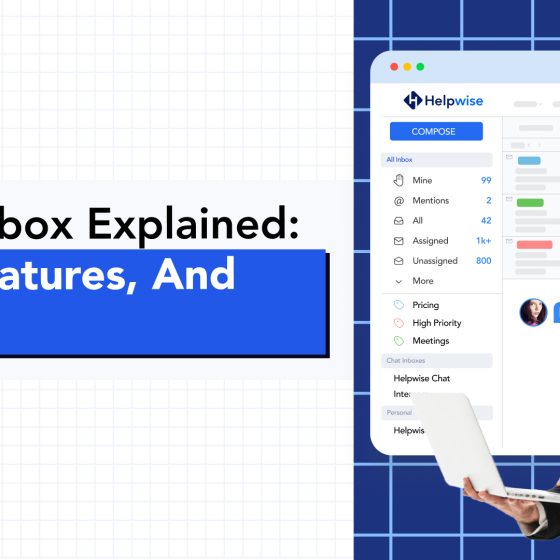How many customers get in touch with you or other C-level execs directly? Most probably a pretty small number, right?
Most of your clients communicate with customer service agents who solve their queries and issues. These customer-facing conversations make or break any brand as they represent the broader organization. They offer critical customer insights, filling the gap between business and customers.
Moreover, the expectations of more than 65% of people have increased over the past 3-5 years. As such, putting the right people in those customer-facing roles is paramount for the long-term growth of your business.
This is especially crucial if your company heavily runs on the revenue generated by higher customer lifetime value (CLV) and uses customer satisfaction (CSAT) score as one of your key performance indicators (KPI).
So, who are the appropriate candidates for those roles, and how to onboard them?
This piece includes a list of essential customer service questions you must include while interviewing candidates.
Understanding the Characteristics of Top Customer Service Talent
Before you start framing questionnaires in your mind, you must understand what you expect to learn from those questions.
No specific checklist of educational degrees and work experiences (WorkEx) makes up for the ideal candidate. Instead, look for tell-tale signs during customer service interviews that cannot necessarily be taught.
Here are the nine key characteristics you should consider when onboarding new customer service agents:
01. Problem-solving
Every other aspect of the customer service job is somehow associated with problem-solving capabilities.
The end goal of your customer service agents is to keep clients happy. That includes steering through a minefield of tricky problems to come up with a surefire solution. Additionally, customer service agents must know how to manage pressures and play it by ear when clients shoot arrows of queries at them.
Besides, most customers often fail to self-diagnose their problems accurately. The responsibility comes onto customer service agents to rephrase the issue in their own words before conjuring up a solution.
That means they must determine not only what went wrong but also what action the client was eventually after.
02. Clear Communication
Your customer service agents will have a tough time fixing clients’ problems if they cannot communicate the solution precisely. Losing concentration, mumbling, or using hard-to-understand vocabulary can leave customers with quizzical looks on their faces.
Customer service agents serve as a two-pronged bullhorn.
On the one hand, they will be your brand’s voice to your clients. On the other hand, they will echo customers’ sentiments and expectations across your business.
Effective communication means putting yourself in people’s shoes and using crisp explanations to reach to a solution as soon as possible.
That means warding off the jargon to break down complicated concepts into highly digestible, straightforward language. Such that even a layman can understand.
The ideal job applicant knows how to keep customer-facing interactions simple and on-spot.
03. Empathetic
How is this a crucial customer service skill? Here is an idea: most customer experiences rest upon how brands treat people.
Even if your customer service agents cannot determine exactly what clients want to hear, infusing conversations with a tincture of concern, care, and understanding will do wonders. Their ability to remain genuine and make customers feel they truly matter to your brand can make a huge difference.
When people complain, they want customer service agents to hear and acknowledge their issues. Being empathetic eases off frustrations and maintains your brand’s image.
04. Positive Outlook
Negativity is not only a personal pain — it rubs off on clients as well. Top customer service talent fills customer-facing conversations with positive and encouraging words/phrases and guides them toward a positive outcome.
They encounter challenges with a can-do attitude. Additionally, they embrace optimism by focusing on solutions rather than thinking of the negative – such that even severe problems will not appear unsolvable.
05. Team-oriented
Being a team player is another integral aspect of customer service. Collaborating seamlessly with others empowers agents to exchange ideas, create innovative solutions, and gain productivity and proactiveness.
For example, customer service champions build buyer personas and convey them to other agents so that everybody is on the same page while handling requests or inquiries.
Besides, customer service staff not working in unison and making clients repeat themselves annoys people so much that they either share the negative experience with others or move on to peers.
Hence, efficient agents share insights on previous customer-facing interactions with everyone. So, if anyone hands over a task to an agent, they can skim through those communications and prep up accordingly.
06. Strong Technical Know-how
The suitable candidates should know the nitty-gritty (if not in-depth) of customer service operations. After all, understanding your customer service framework from front to back is necessary to figure out how to react to customers’ troubles.
If customer support agents do not keep pace with evolving customer service trends and strategies, they cannot serve clients efficiently.
Moreover, believe it or not, many customer service queries represent wonderful opportunities to make yet another sale.
The chances of selling to an existing client are 60-70% – but only if your agents are versed in making the right offer at the right time.
07. Thick-skinned
Working in customer service is “like a box of chocolates: you never know what you are going to get.” Your agents could face a completely confused customer one minute, an annoyed client the next, or a perfectly patient person who turns around and criticizes your brand online.
As burdensome and anxiety-inducing as customer support can be, customer service rockstars display ample self-control — even when customers do not. They keep their cool even when blasted and maintain professionalism when a client gets personal.
08. Responsiveness
While being patient and spending a few extra minutes with customers to understand their expectations is splendid, customer service agents cannot afford to do that for every customer.
Ticket overflows can frustrate agents, tempting them to let an email stay in the inbox for a little longer or the phone ring a few extra times. However, those who prioritize efficiently getting to a solution are the ones you should be paying attention to.
These agents quickly recognize when they cannot help a client and immediately transfer them to someone who can help.
09. Accountability
For about a third of clients, how customer service agents handle queries without escalations or transfers is one of the most crucial skills.
Your agents are on the front lines of experience and satisfaction, but how many will show up when problem occurs? Very few will take the responsibility of the situation.
Intelligent customer service agents are sorted about what they can and cannot take responsibility for, simplifying customer interactions. Moreover, they openly realize and accept their mistakes and perceive them as learning opportunities.
Interview Questions for Assessing Emotional Intelligence and Empathy
Q. How would you calm down frustrated customers?
To screen for emotional intelligence, this customer service interview question helps you determine a person’s philosophy of handling angry customers. Look for signs that the job seeker knows how to empathize with customers, and that they can transform a poor experience into a positive one.
Answers that stand out will include references to solid issue-resolution skills, respect for clients, and humility. That is because apologizing is more effective than explaining an already irked client.
Q. Have you ever walked the extra mile to help a customer?
This customer service interview question not just helps you find out how candidates helped a customer but also about who they are.
Strong contenders have more than a few examples to draw from, and they should puff their chests up while sharing them. Besides, notice their body language, such as grinning or talking at a higher pitch, showing that they really love the work.
Does the answer sound like they are pushing too hard to please you? Or does it sound like a genuine response through a mature and self-analytical lens? Applicants who are authentic and reflective in their answers should make it to your customer service team.
Interview Questions for Evaluating Problem-Solving and Critical Thinking Skills
Q. Tell me about a time you handled a demanding customer. What did you do to resolve the situation?
Customer service job interview questions like these offer a gist of how candidates operate.
Here, look for traces of emotional intelligence, issue-resolution skills, and being able to follow customer service protocols.
Filter out candidates who focus their story on the steps they executed to fix the problem versus those who complain about customers and how they had a hard time. The perfect picks will not bad-mouth their customers.
Q. How would you deal with customers who have been transferred to multiple agents and still did not get satisfying answers?
This customer support interview question will help you know how a candidate would manage a challenging situation where a client has been passed around numerous times and feels like nobody can help them.
Single out the candidates who discuss how they took ownership of the client-facing conversation. The ideal ones will walk you through their approach to being the client’s last stop and fixing the issue, alongside the outcomes of those actions.
Interview Questions for Measuring Adaptability and Resilience under Pressure
Q. How would you respond when you cannot help out a customer?
Candidates should describe the client’s issue, the steps they took to resolve it, why things did not work out favorably, and the alternative they implemented.
For such behavioral interview questions for customer service, look for answers that showcase a competency in handling customers’ needs as well as innovation on a corporate level.
Further, watch out for candidates who mention following up with customers beyond the initial (unresolved) conversation.
Q. Tell me about a time you committed a mistake in your previous role. How did you recover from it?
This customer service interview question helps you examine honesty and coachability. Of course, everybody makes mistakes, but the crucial part is whether the aspirants own their mistakes – or pin them on somebody else.
Some job seekers will cover themselves up while answering. Look for an answer where candidates take responsibility for their mistakes with their chins up and elaborate on how they picked themselves up after a wrong move.
Such responses reflect candidates’ sense of resilience, personal responsibility, and capability to learn from potential errors.
Interview Questions for Assessing Communication and Active Listening Skills
Q. How would you reframe this canned response?
This customer service interview question is especially beneficial for support roles across multiple communication channels.
Provide the interviewee with a badly written canned response and offer them some time to rewrite it. Ask them what was wrong with the original message and why they made those changes.
The right candidate will produce a desirable result and be able to explain why tweaked the initial response. Effective communication skills are key in a customer-facing role. Moreover, a perfect “answer” will be clear and concise, without jargon, and without sounding robotic.
Q. During peak hours, how do you handle each request?
This customer service interview question is an opportunity for capable candidates to shine among contenders by explaining how they communicate with customers.
Eligible candidates will flaunt their knack for interpreting customers’ needs and adjust their communication styles for multiple audiences. Contrarily, candidates skilled in only a single communication approach are inflexible and thus are a big no-no.
Interview Questions for Identifying Collaborative and Team-Oriented Mindsets
Q. Describe a time you teamed up with a colleague to fix an issue.
In this customer support interview question, you want to know whether the applicant goes along well with others and possesses the necessary communication skills to accomplish team projects together.
Good responses include a well-elaborated problem, action steps, and coworkers’ contributions decorated with some anecdotes.
Q. How would your ex-colleagues describe you?
You might get an obvious answer to this customer service interview question by aspirants’ body language and how they interact with you throughout the interview.
Still, ask for a story where candidates had a colleague’s back and built rapport with them. That way, you can determine if applicants enjoy interacting with people and know how to strengthen relationships.
Interview Questions for Identifying Technical Understanding and Skill Level
Q. Can you walk me through every step of a typical customer service process?
This is a must-have interview question for customer service roles as these individuals will be engaging with clients on a deeper level regularly. As such, demonstrating processes bit-by-bit is essential for the job.
Look for answers that you find easy to understand and follow. Check if the steps are detailed and contextualized enough to help even a non-technical individual.
Q. Are you well-versed in customer service software?
In this digital economy, companies and employees still immune to tech intervention will likely degrade into liabilities.
So, answers to this customer service interview question will reveal how savvy applicants are with tech-enabled solutions. Ask if they have any experience with, for instance, customer service software.
Even if any job seeker responds negatively, they should show openness to learning and training.
Additional Interview Tips for Hiring Top Customer Service Talent in 2023
Apart from the exhaustive list of customer service interview questions and answers discussed above, here are some bonus tips while interviewing applicants:
Attitude Matters
Skilled and experienced customer service applicants with rotten attitudes fizzle out quickly. On the contrary, those with excellent attitudes succeed in the long irrespective of the prior WorkEx. So, prefer such candidates as they are more receptive to growth and learning.
So Does Personality
Attitude is a person’s approach to the customer service job. Personality is about accommodating. Question whether candidates have the personality that will fit in with other agents and the company’s culture. This is not about how motivated or excited they are about the job – but rather about fitting in.
Evaluate Candidates’ Definition of Customer Service
“What does customer service mean to you?” This is a powerful customer service interview question to which you can receive multiple correct answers. These answers speak particularly to applicants’ professional and personal values – and if they line up with those of your organization.
Worthy candidates empathize and appreciate customers and exhibit their commitment to contributing to your brand’s mission by helping and supporting others.
Offer Delightful Customer Service by Hiring the Right People
No matter how great your offerings are, people will turn to your competitors if your customer service is below par – at least 80% of customers believe so.
So, how to decide if that brilliant and eager customer service candidate will be an asset to your team during customer service interviews?
While there is no fail-safe approach, asking the right questions about customer service in an interview is quintessential to vetting candidates. They compel interviewees to think on their feet and draw upon their experiences.
How they respond speaks volumes about how they will tackle real-life situations — and will keep you from wasting energy and time onboarding the wrong person.
Sign up with Helpwise (the trial is free for 14 days) to show your customers you care every single day.
FAQs
Why is onboarding the top customer service talent important?
No matter how good your data is, how finely tuned your processes are, or how well-set your caned responses are, onboarding the wrong customer service agent will hamper your brand reputation.
Customer service agents represent a company and are the most direct point of human contact with customers. As such, hiring suitable candidates for customer service roles is pivotal to cap customer acquisition costs, boost retention, and mint profits.
What characteristics should business leaders look for when interviewing customer service candidates?
While asking interview questions for customer service, brands must recruit the job seeker having the ability to:
- Remain positive throughout customer-facing conversations
- Firmly grasp customer service operations and technicalities
- Communicate with crisp, easy-to-understand language
- Take responsibility for every action
- Genuinely listen to and understand customers’ sentiments and needs
- Effectively resolve issues – simple or complex
- Collaborate with other agents









